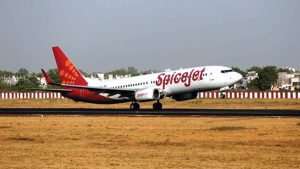Bloomberg
SpiceJet Ltd staged one of global aviation’s most remarkable turnarounds in 2015 after founder Ajay Singh swept in at the eleventh hour to rescue it. Less than a decade later, the Indian budget airline needs a revival of fortunes again.
Once an investor darling, SpiceJet is now the worst-performing airline stock in Asia, fighting a run of negative publicity triggered by a slew of seemingly innocuous but frequent technical glitches. The airline also hasn’t restored pilot salaries even after a surge in domestic demand and has delayed releasing quarterly results for the three months ended in March citing a ransomware attack on its servers. It’s reportedly fallen behind on statutory dues, too.
SpiceJet has struggled in India’s cut-throat aviation market — the world’s fastest growing — where even before the pandemic fierce price wars led to wafer-thin margins. Covid-19, which destroyed travel, came as a potentially fatal blow for many carriers around the world, including SpiceJet, as their main revenue source dried up.
“Unless SpiceJet injects fresh funds, it will be difficult for them to survive,†said Harsh Vardhan, chairman of New Delhi-based Starair Consulting and former head of Vayudoot, a now defunct Indian regional carrier that was merged with Indian Airlines in the 1990s. Repeated technical failures have “shaken public confidence. When people keep reading about SpiceJet’s missed payments to airports and oil companies, forward bookings diminish,†he said.
The technical incidents mean the airline — which bills itself as “Red, Hot, Spicy†— is now under scrutiny from India’s aviation safety regulator. Earlier this month, the Directorate General of Civil Aviation (DGCA) gave SpiceJet three weeks to explain why action shouldn’t be taken against it following multiple mid-air snags. It also noted that SpiceJet has frequently invoked a clause that allows flights to proceed when some parts are malfunctioning so long as those parts aren’t essential to the flying or safety of the aircraft.
That notice from the regulator said SpiceJet has failed to establish “safe, efficient and reliable air services,†and a number of its aircraft returned to their origin or continued their journey with “degraded safety margins,†according to the missive, a copy of which was posted on Twitter.
SpiceJet said in a statement to Bloomberg that it will be “responding to the DGCA within the specified time period.â€
But SpiceJet’s problems don’t just end with technical malfunctions. In late 2021, the airline had cash and cash equivalents of just 729 million rupees ($9.1 million) compared with total debt of 97.5 billion rupees.
 The Gulf Time Newspaper One of the finest business newspapers in the UAE brought to you by our professional writers and editors.
The Gulf Time Newspaper One of the finest business newspapers in the UAE brought to you by our professional writers and editors.
